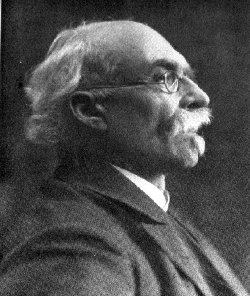Hans Vaihinger facts for kids
Quick facts for kids
Hans Vaihinger
|
|
|---|---|
 |
|
| Born | September 25, 1852 Nehren, Kingdom of Württemberg
|
| Died | December 18, 1933 (aged 81) Halle, Province of Saxony
|
| Alma mater | University of Tübingen Leipzig University University of Berlin |
| Era | Contemporary philosophy |
| Region | Western philosophy |
| School | Neo-Kantianism Fictionalism |
|
Main interests
|
Epistemology |
|
Notable ideas
|
Fictionalism (philosophy of 'as if') |
|
Influences
|
|
|
Influenced
|
|
| Signature | |
 |
|
Hans Vaihinger (born September 25, 1852 – died December 18, 1933) was a German philosopher. He is famous for his ideas on how we understand the world. His most well-known book is The Philosophy of 'As if', published in 1911. In this book, he explained that people often use ideas and concepts "as if" they are completely true, even if we can't prove them. Vaihinger was also a leading expert on the philosopher Immanuel Kant.
Contents
About Hans Vaihinger
Hans Vaihinger was born in a town called Nehren, in Germany. He grew up in a very religious family. He studied at several universities, including the University of Tübingen, Leipzig University, and the University of Berlin.
After his studies, he became a teacher. Later, he became a professor of philosophy at the University of Strasbourg. In 1884, he moved to the University of Halle. By 1892, he was a full professor there.
Understanding the Philosophy of 'As If'
In his book, Die Philosophie des Als Ob (which means The Philosophy of 'As if'), Vaihinger explained a big idea. He believed that humans can never truly know the real nature of the world around them. Because of this, people create ways of thinking and then act "as if" these ideas are completely true.
How 'As If' Works in Science
Vaihinger used examples from science to show his point. Think about things like protons, electrons, and electromagnetic waves. Scientists can't see these things directly. But science acts "as if" they exist. They use these ideas to make new discoveries and build better understandings of the world. Even if these ideas aren't perfectly real, they are very useful for science to move forward.
The Principle of Fictionalism
Vaihinger called his main idea the "principle of fictionalism". He said that an idea, even if it's not perfectly true or correct, can still be very useful in real life. It might not be true in theory, but it can have great practical importance.
He also explained that his philosophy was not about doubting everything. Instead, it was about accepting that some ideas, even if not fully provable, are helpful. They help us solve problems that don't have easy answers.
Different Kinds of Fictions
Vaihinger talked about different types of "fictions." Some are "half-fictions" or "semi-fictions." These are ideas that are only slightly different from reality. For example, we assume the world will still be here tomorrow, even though we can't know for sure.
Then there are "real fictions." These are ideas that might even seem to go against themselves. An example is the idea of an atom. We use the idea of atoms to understand matter, but the concept itself can be tricky to define perfectly. Our thinking starts with small differences from reality and then uses bigger, more complex ideas.
Influence on Psychology
Vaihinger's ideas were very important for other thinkers, especially in psychology.
Alfred Adler and Fictional Goals
Alfred Adler, who created a type of psychology called Individual Psychology, was greatly influenced by Vaihinger. Adler used the idea of "useful fictions" to explain how people set goals. He believed that people often create a "fictional final goal" for themselves. This goal might not be fully realistic, but it guides their actions and helps them live their lives.
George Kelly's Personal Construct Psychology
Another psychologist, George Kelly, also used Vaihinger's ideas. Kelly's theory, called personal construct psychology, suggests that our ways of understanding the world are like useful guesses or "hypotheses." They are not perfect pictures of reality. Kelly said that Vaihinger's "as if" philosophy helped him see that all human understanding can be thought of as a set of helpful ideas. He believed that even big ideas like God or reality could be seen as useful ways of thinking, rather than absolute truths.
Works by Hans Vaihinger
- 1876 Hartmann, Dühring und Lange
- 1897–1922 Kant-Studien (He founded and edited this journal)
- 1899 Kant—a Metaphysician?
- 1902 Nietzsche as Philosopher
- 1911 The Philosophy of 'As if'
- 1922 Commentary on Kant's Critique of Pure Reason
See also
 In Spanish: Hans Vaihinger para niños
In Spanish: Hans Vaihinger para niños
 | Jackie Robinson |
 | Jack Johnson |
 | Althea Gibson |
 | Arthur Ashe |
 | Muhammad Ali |

